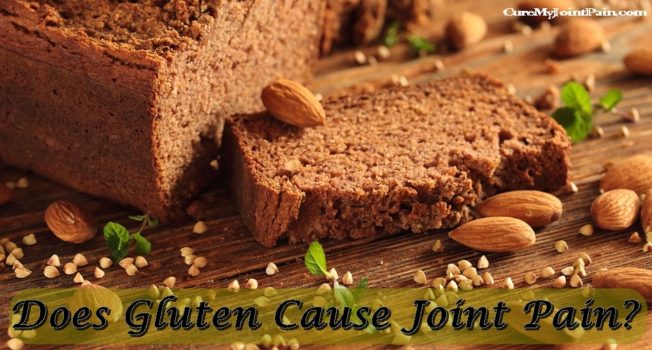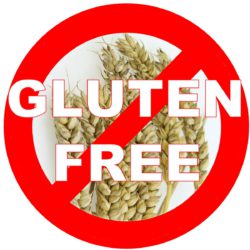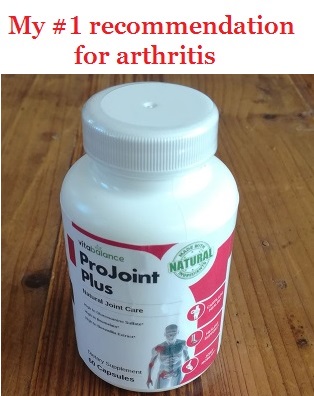Does Gluten Cause Joint Pain? (The Good & The Bad)

At this point – gluten is considered a really harmful ingredient. It can cause diarrhea, nausea, headaches and the list can go on forever.
But what about joint pain? Does gluten cause joint pain itself? Or it’s simply amplified?
- Is there any relation between gluten intolerance and joint pain?
- Are people with this diagnosis most likely to deal with arthritis at one point?
I tried to take a look at every aspect about gluten and joint pain. So here’s the connection.
#1 – What Science Says
Is there a link between gluten intolerance and joint pain? Believe it or not – scientists don’t have a clear answer.
 In fact, opinions are divided in the medical world:
In fact, opinions are divided in the medical world:
- For some, gluten intolerance is a risk factor for arthritis.
- Others say there’s no link between the 2.
- A third group admits there might be a link, but it’s usually genetic.
But that’s not all.
There’s a fourth category – they associate gluten consumption with joint pain, which is pretty absurd.
Why? Most people consume high quantities of gluten our entire lives without developing any joint problem.
So at this point – science has no clear answer and very little data.
For this reason, I tried to do a brief analysis myself. Here’s what I considered:
- the good and the bad points of gluten intolerance
- how many people developed arthritis afterwards
But before I get to the pros and cons – there’s something you have to understand.
#2 – Gluten Intolerance Vs Gluten Sensitivity
If you want to understand the link between gluten and joint pain – this aspect is essential.

So here’s the thing.
1. Gluten Intolerance – it means that your body can’t absorb gluten. For this reason, you start suffering from:
- nausea
- diarrhea
- chronic inflammation
Once there’s chronic inflammation in your body, you will start to experience different kinds of pain.
And your joints will be among the first to hurt.
2. Gluten Sensitivity – it means your body is allergic to gluten.
But unlike the intolerance, you will only experience minor symptoms:
- digestive problems
- no chronic inflammation
So basically – gluten allergy affects just your digestive system, it has nothing to do with the joints.
Conclusion: There’s one major difference between the 2 – chronic inflammation:
- It exists in gluten intolerance
- It’s absent in gluten allergy
So now that you know this difference, it’s time to analyze the positive and the negative side.
#3 – The Good: Gluten Can’t Cause Joint Pain Alone
Now – I know opinions are pretty mixed up on this topic.
But after doing a closer analysis, here’s what I can tell:
- Eating gluten foods doesn’t cause joint pain.
- Gluten itself isn’t a risk factor for arthritis.
Basically – gluten can’t cause joint pain to people who are otherwise healthy.
To help you understand better, let’s take a look at 2 situations:
Case #1 – You’re not allergic or intolerant to gluten.
Well, consuming lots of foods that are rich in gluten isn’t going to cause you joint pain.
In fact – it won’t even increase your risk of getting arthritis. So there’s nothing to worry about.
Case #2 – You have a gluten intolerance.
Next, you eat some products that contain gluten. What’s the consequence? Inflammation throughout your body:
- At first, it’s just in your intestines
- So you will only experience digestive problems
- But short after, your joints will also be affected
- And that’s when the pain will come up
Conclusion: So basically, eating gluten your entire life won’t cause you joint pain. It won’t even increase the risk.
Simply eating wheat products won’t make your joints hurt. You have no reason to fear when it comes to this.

#4 – The Bad: Gluten Can Worsen An Existing Condition
Here’s the thing:
 Gluten itself can’t produce joint pain to a healthy person
Gluten itself can’t produce joint pain to a healthy person- But it can aggravate an existing problem
So basically, if you already have arthritis or any inflammatory condition – eating gluten can worsen your pain.
In fact – it could be the reason behind your flare-ups.
Just try to ask yourself:
- Is your pain more severe after eating gluten rich foods?
- Do you get more flareups?
But let me explain why gluten can worsen an existing pain:
- Let’s say you have arthritis for a while.
- Additionally, you might also be allergic to gluten without knowing it (allergic, not intolerant).
- That allergy is something minor, so it doesn’t cause joint pain alone.
- However, eating gluten rich foods can contribute to your existing pain.
- That’s why it can worsen your existing arthritis.
So basically – that’s why many people with arthritis feel much better after going gluten-free.
They might have had a mild gluten allergy – and they weren’t aware of it.
Obviously, your arthritis wouldn’t be cured in this case. But it might get a lot better.
Conclusion: If you already have arthritis, gluten may be increasing your pain.
But this only happens if you’re allergic to it – which you may or may not know.
#5 – The Bad: Gluten Intolerance May Cause Joint Pain
That’s why you have to understand the difference between gluten intolerance and gluten sensitivity:
- You may be allergic to gluten without knowing it
- But if you have gluten intolerance, you can’t ignore the symptoms
Now – joint pain is one of the most common signs in gluten intolerance.
But in order to understand better, let’s take 2 situations again:
Case #1 – You’re allergic to gluten and have no other health problem.
In this case, eating gluten rich foods should cause you at most:
- nausea
- vomiting
- diarrhea
As you can see, joint pain isn’t on that list.
Case #2 – You have gluten intolerance and you’re otherwise healthy. In this situation – you have all chances to experience joint pain.
To put it more clearly, gluten intolerance can produce joint pain even to healthy people.
Conclusion: So it’s all about how sensitive you are to gluten.
- If you’re just allergic, you must have an existing joint problem to experience joint pain.
- But if you have intolerance, you can be healthy and still get joint pain.

#6 – How To See If You’re Allergic To Gluten
So basically – you should know if you’re gluten intolerant. The symptoms are too severe to ignore.

But what about gluten sensitivity? It doesn’t have so serious symptoms – so it can be ignore.
How can you tell if you’re allergic to gluten or not? Unfortunately:
- there’s no specific test
- even gluten intolerance is hard to diagnose using blood tests
But there’s one thing you can do to see if you’re allergic to gluten.
Try going for a gluten-free diet for a few days. Try to give up every food containing wheat:
- bread
- cereals
- pastry
It may be really challenging at first, but after a few days it should get easier.
So try doing this for a couple of days:
- Eat lots of fruits and vegetables
- You can even consume products that are gluten-free (there are many on the market)
If you notice your pain is improving, you are probably allergic to gluten.
If not, the cause beneath your pain is most likely arthritis alone. So in this case, a gluten-free diet isn’t going to help.
My Verdict – Does Gluten Cause Joint Pain?
Short answer: It might, but it depends on your health condition. Thing is:
- Gluten alone doesn’t cause joint pain to healthy people
- If you already have arthritis, it may worsen your pain
- But you need to have a minor allergy to gluten
So basically – gluten doesn’t have anything to do with joint pain. At least not in healthy people.
In order to be a real risk factor, you need to:
- have an existing joint pain/arthritis
- be allergic to gluten (but you may not know it)
It might sound complicated – but in reality, it’s pretty simple.
So honestly, there are quite a few chances that gluten is behind your joint pain.
You can surely investigate on this matter, but in most cases – it has very little to do with the pain itself.
 Gluten itself can’t produce joint pain to a healthy person
Gluten itself can’t produce joint pain to a healthy person




Nice article. I think gluten you can relieve your arthritis if you follow a non-gluten diet for a while. It makes sense. But I think it would be hard to follow it, at least in the first days.
I have psoriatic arthritis. Do you think it’s worth going for a gluten-free scheme? I will have a hard time following it so I’d really wish it was worth it. Thank you.
Hey Timmy, I really think it’s worth giving it a shot. Except a few days with tasty food, you’re not losing anything.
But if you think gluten-free is too hard to start with, there are some other diets than can help with psoriatic arthritis. None of them is as hard as the gluten-free one, because you don’t have to give up so many foods. So you can start with one of these and see what happens.
My joint swell and hurt right after eating anything with gluten. I have watched my middle finger on right hand begin to swell after eating something with gluten in it and after making my husband a sandwich. I have autoimmune disease lupus.
Hi Katherine, thanks for sharing your experience. Going for a gluten-free diet will surely help, even though it looks a bit hard to follow. Just like in RA or PsA, the symptoms from lupus can also get worse due to gluten – and it also seems to be your case. Try going gluten-free for several weeks and see what happens